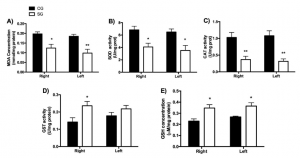Safflower oil supplementation during pregnancy decreases oxidative stress offspring brain.
This placebo-controlled in vivo study evaluated in gestational rats the effects of safflower oil supplementation of mothers during brain development period (from 14th day of gestation throughout lactation) on the brain electrophysiology and cortical oxidative status in the offspring.

Biomarkers of cortical oxidative status (in right or left brain part) in rats that were previously raised by mothers which received safflower (SG) or control oil (CG) in their diet during pregnancy and throughout lactation. MDA: Malondialdehyde; SOD: Superoxide dismutase; CAT: Catalase; GST: Glutathione-s-transferase; GSH: Glutathione
Offspring from supplemented mothers presented reduction of the cortical spreading depression showing a greater brain excitability compared to placebo group. They also presented a reduction by 39.4% of lipid peroxidation (p < 0.05) compared to placebo. Supplementation reduced superoxide dismutase activity by 40.4% and catalase activity by 64.1% compared to placebo (p < 0.05) but increased activity of glutathione-S-transferase and glutathione level (p < 0.05) compared to placebo.
In conclusion this study demonstrated a long-lasting effect on brain excitability and oxidative stress biomarkers in the offspring born from dams that received safflower oil from the 14th day of gestation until the end of lactation.
Mendes-da-Silva RF, Ferreira DJS, Lopes-de-Morais AAC, Cavalcanti de Macêdo PF, Lagranha CJ, Batista-de-Oliveira-Hornsby M. Safflower (Carthamus tinctorius L.) oil during pregnancy and lactation influences brain excitability and cortex oxidative status in the rat offspring. Nutritional Neuroscience. 2017 Aug 04:1-8.
